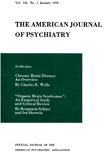SENSORY HABITUATION AND DISCRIMINATION IN THE HUMAN NEONATE
Abstract
In summary, in the process of exploring the neonates' behavioral and autonomic repertoire for the purpose of devising techniques that would enable us to measure temperamental differences, we have come across two phenomena that we would like to emphasize. First we described the neonate's ability to habituate his responses to sensory stimuli and pointed out its possible relations to the neurophysiological structure subserving arousal, inhibition and attention; second we demonstrated that neonates have the capacity for sensory discrimination but noted that this primitive discrimination and habituation need not be dependent on the functioning of cerebral cortex and does not appear to be identical with the same phenomena in the mature organism.
Access content
To read the fulltext, please use one of the options below to sign in or purchase access.- Personal login
- Institutional Login
- Sign in via OpenAthens
- Register for access
-
Please login/register if you wish to pair your device and check access availability.
Not a subscriber?
PsychiatryOnline subscription options offer access to the DSM-5 library, books, journals, CME, and patient resources. This all-in-one virtual library provides psychiatrists and mental health professionals with key resources for diagnosis, treatment, research, and professional development.
Need more help? PsychiatryOnline Customer Service may be reached by emailing [email protected] or by calling 800-368-5777 (in the U.S.) or 703-907-7322 (outside the U.S.).



